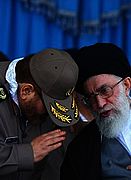Readiness To Confront Ahmadinejad’s Sedition
» The Growing Anxiety of the Military
Less than two months are for the presidential elections in Iran and each remark made by senior official and representative adds to the sense that state authorities are deeply and growingly concerned about another round of trouble in late June. But unlike 2009 when reformists challenged the elections process and the official announcement of the results, now the growing threat comes from a one-time insider and his allies. President Mahmoud Ahmadinejad was once the exemplary chief executive of the country’s paramount leader ayatollah Khamenei. But now, the ayatollah’s representatives in the military and other state agencies warn that they are ready to “decisively” deal with possible unrest and “sedition” in the country. Some have even said that should levels of tension continue Khamenei may even “break his silence”, remarks that are interpreted to mean he will act against Ahmadinejad.
In this light, the chairman of the joint chiefs of staff recently said, “Our armed forces are fully prepared to confront any possible sedition to achieve the political epic in the elections.” Hassan Firuzabadi made these remarks to Mehr news agency, affiliated with the Islamic Propagation Organization, and added, “Our armed forces have experienced the 2009 sedition and are knowledgeable in the details of dealing with this kind of threat.”
Firuzabadi is known as the Basiji general who was appointed to this senior position even though he lacked any military record. In his comments he also said that the armed forces were not a political force to have political analysis. “Our armed forces have the duty of planning and being ready, and watch those areas where events may take place.”
Ayatollah Khamenei’s representative in the Revolutionary Guards too made similar comments. “The forces of the Guards and the Basij are prepared to decisively maintain security under any conditions.” General Mohammad Hossein Sepehr added, “The enemy views elections as the best opportunity to change the Islamic republic.”
The cultural deputy of the Revolutionary Guards Corps Mohammad Hossein Safar Herandi echoed similar words when speaking to a group of Basij militiamen in the town of Neishaboor. “Iran’s intelligence awareness in the 2013 elections will surprise the enemy,” he asserted. Herandi is a former cabinet minister who was sacked by Ahmadinejad and has now turned into one of the president’s critics. In his comments he also said that if “unethical behavior continued, it could result in the supreme leader’s decision to break his silence, similar to the situation in the Majlis last year.”
He then made a revealing comment. “Some individuals inside the reform administration (a reference to Mohammad Khatami’s presidency) had threatened at the time to postpone the elections which was met with a decisive response from the supreme leader. OF course today too it is possible that some may have similar intensions which most certainly will receive the same response,” Herandi said.
Last Saturday, another Revolutionary Guard commander made similar remarks in the city of Mashhad. He claimed that the enemy had made plans for the next presidential election and expressed his concerns about this. General Hamid-Reza Moghadamfar said, “The first goal of the enemy is to dissuade people from participating in the elections. The second is to create unrest by any means to show that the elections lacked integrity. Creating divisions in society and particularly among officials are among other goals of the enemy.”
Last week ayatollah Khamenei’s military advisor, Revolutionary Guards general Rahim Safavi also made threatening remarks and warned that any actions to create “sedition or unrest” by the “domestic enemies” would dealt with strongly. He made these remarks at Beheshti University in Shiraz where he warned “domestic and foreign enemies, counter revolutionary groups, and groups that were corrupt and deviant.”
These concerns are rooted in the fear that Ahmadinejad may attempt to postpone the elections if his presidential candidate is rejected by the Guardians Council, thus creating yet another serious challenge for the regime.
In early March, the cultural deputy of the Revolutionary Guards had told a group of commanders and members of the force in Shahrud that “a sedition deeper than the 2009 sedition was on its way.”


